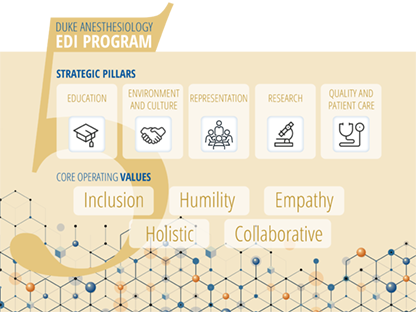

Advancing Equity: Diversity and Inclusion in Anesthesiology
Growing up in the US as a Cuban American, Jennifer E. Dominguez, MD, MHS, witnessed how social determinants of health such as language and cultural differences, or level of education can negatively impact patients’ health outcomes.
“I’ve seen my own family members navigate a number of health issues that were complicated by low medical literacy, mistrust of and difficulty navigating the health system, and by barriers in access to health care,” she says. “So, early in life I learned that those social determinants can negatively impact patients’ health outcomes and need to be addressed.”
Those personal experiences made a lasting impression on Dominguez, who sought to learn more about how to support patients navigating these types of challenges while she was a student in New York City. She volunteered with a Harlem Hospital-based organization to help patients identify resources in the community to address issues such as food and housing instability, employment, domestic violence, and childcare. Once she entered medical school at Yale, Dominguez volunteered in her school’s free clinic and became a leader of the Latino medical students’ organization. There, she advocated for diversity and inclusion in the medical school’s admission process, provided support to underrepresented in medicine (URiM) students, and ran a program for local URiM high school students to learn more about pathways to careers in health professions. “Being a part of that community of URiM medical students at Yale was crucial to my success in medical school,” recalls Dominguez.
When she joined Duke Anesthesiology faculty in 2013, Dominguez sought a similar community and became active in the department’s Anesthesiology Inclusivity Committee (AIC), which was established more than a decade ago. In 2020, she was named the co-chair of the AIC, along with Dr. Adeyemi Olufolabi. Those years of experience prepared Dominguez for her newly-appointed role as interim associate vice chair for equity, diversity and inclusion within Duke Anesthesiology, in which she aims to expand the visibility and scope of the department’s commitment to advance equity and inclusion; she is the first person to serve in this newly-created role. Her initial steps involved developing and implementing a strategic plan for the program and building an Equity, Diversity and Inclusion (EDI) Leadership Team. She was supported in these efforts along with other EDI leaders as a participant in the Duke University School of Medicine’s Racial Equity Learning Arc, a program focused on building competency around collaborative EDI planning and strategic development.
EDI Program Mission Statement:

To cultivate a just and inclusive culture in which individuals thrive and are dedicated to alleviating suffering, improving health and well-being, and promoting social justice for all, through excellence in innovation, education, research, service, and professional growth.
Dr. Jennifer Dominguez, Interim Associate Vice Chair for EDI
As an obstetric anesthesiologist, Dominguez draws passion and motivation for the EDI Program’s vision, mission and strategy from witnessing patient experiences during the peripartum period. She points to the high maternal mortality and morbidity rate in the United States compared to peer countries as an indicator of how disparities can impact patient outcomes. According to the Centers for Disease Control and Prevention, the maternal mortality rate in the US in 2021 was 32.9 maternal deaths per 100,000 live births, while the risk of dying in the peripartum period for non-Hispanic Black mothers was 2.6 times the rate for white mothers (69.9 deaths per 100,000 live births).
“We have the highest rate of maternal mortality of any developed country in the world, and the rates have increased in recent years. Marginalized groups suffer a disproportionate burden of the morbidity and mortality,” Dominguez says, adding that she and the EDI team are focused on implementing a strategic plan to develop a more robust program that advances health equity for marginalized populations. “Identifying and eliminating health disparities within anesthesiology, critical care and pain medicine is my North Star for this program,” says Dominguez of the program’s vision.
Bringing a wide range of voices and stakeholders into the EDI conversation is a major focus of Dominguez’s approach. Within the EDI Leadership Team, she has appointed champions among faculty and trainees across the department, who will work within their focus areas to identify opportunities, implement programs, and foster and support an inclusive culture.

The Duke Anesthesiology EDI Program is aligned with the School of Medicine’s strategic plan for advancing equity, diversity and inclusion, which was implemented in 2021 and serves as a guide for individual departments to coordinate their efforts. Dominguez also serves on the School of Medicine’s EDI Leader Council, which provides development, community and support for the EDI leaders across the school under the leadership of its first vice dean for EDI, Dr. Kevin Thomas.
“The School of Medicine has been undergoing a robust process over the last couple of years, launching an anti-racism campaign called ‘Moments to Movement,’ which has allocated more resources and greater institutional attention to EDI issues,” Dominguez says. “They have provided structure, resources and training to all of the School of Medicine EDI leaders to support their work within their individual departments.”
The five strategic pillars of the anesthesiology department’s EDI Program are aligned to support its vision and mission: 1) representation; 2) education; 3) environment and culture; 4) quality and patient care; and 5) research. With Dominguez’s leadership, she and the EDI champions will advance strategic goals and initiatives within these domains that are impactful and sustainable.
The representation pillar addresses recruitment and retention of diverse faculty, trainees and staff. While women are no longer underrepresented in US medical schools, says Dominguez, they remain underrepresented within anesthesiology training programs and among academic faculty. Physicians of American Indian or Alaska Native, Black, Latino, or Native Hawaiian or other Pacific Islander identities remain underrepresented in medicine (URiM) and anesthesiology, according to the Association of American Medical Colleges. Resident recruitment is a vital component of Duke Anesthesiology’s EDI Program. When Dominguez became co-chair of the department’s AIC in 2020, one of her first initiatives was to work closely with Dr. Annemarie Thompson, the residency program director, to look at the recruitment process and address any potential biases or barriers.
“We looked at each step of the process, from the ways in which people learn about our programs, to how we screen applications, and who interviews or interacts with our applicants on their interview days,” she says.
From that analysis, a team of diverse faculty that included the EDI Leadership Team’s Dr. Eric JohnBull was assembled to develop a standardized set of behavior-based questions for potential candidates to ensure all applicants would get similar questions during their interviews. They also were revised to include questions about cultural competency, such as how candidates would care for patients from different backgrounds. Several of the department’s fellowship programs also implemented similar changes to their recruitment processes.
“With these changes, we’ve already been able to attract and recruit more diverse trainees into our residency and fellowship programs in the last few years than we had previously. The 2022 intern class was the most diverse group of residents ever at Duke Anesthesiology. We also have seen continued growth in the representation of women in our residency program to exceed national averages for anesthesiology residency training programs,” reports Dominguez.
She says the department also has been able to retain several of those fellows to stay on as faculty, increasing the diversity of faculty that future students and trainees are taught and mentored by. Strategies to increase the representation of URiM faculty within the department have been implemented in tandem and have started to yield results. “The input of EDI champions for residents, fellows and faculty will be crucial in helping us improve recruitment and retention efforts across all of these groups. In the future, we plan to add a staff champion to the EDI Leadership Team,” says Dominguez.
And to support diverse students once they’re admitted to medical school, Dominguez and her team have established several programs that enrich their education. For example, Duke Anesthesiology helps women and underrepresented students connect with mentors within the department for shadowing opportunities. The EDI team also has established a scholarship program to support travel and living expenses for qualified URiM visiting medical students to rotate at Duke University Hospital in anesthesiology. In 2022, the department supported two URiM fourth-year medical students during their visiting rotations; and there are plans to continue offering this type of support.
Additionally, Dominguez says the department has forged a strong relationship with the Student National Medical Association (SNMA), which represents the interest of Black medical students. She and Dr. Grace McCarthy, the EDI Leadership Team’s champion for medical student education, have plans to strengthen ties with other medical student affinity groups. As part of that collaboration with SNMA, Duke Anesthesiology works with Duke’s Health Professions Recruitment and Exposure Program, which provides professional development and mentoring to URiM high school students interested in pursuing careers in health care, often through on-campus workshops. During a recent event, the department hosted students in the Duke Human Simulation and Patient Safety Center to practice procedures and interact with medical students, faculty and residents.
“They learned how to place endotracheal tubes and intravenous lines in mannequins in the simulation lab, but I think most importantly, they heard from individuals on a diverse panel about their paths to a career in medicine, the different obstacles that they overcame and how they navigated them,” says Dominguez.

For her, an effective EDI strategy must include an education component; not only has she modified the curriculum for the Duke Obstetric Anesthesiology Fellowship, of which she is the program director, she led a national committee to revise the ACGME curriculum for all obstetric anesthesiology fellowship programs to include more health equity topics, among other updates. One of her strategic goals for the EDI Program is to collaborate with the residency program leadership and the department’s two appointed EDI education champions, Drs. Amanda Kumar and Peter Yi; together, they will create a comprehensive health equity curriculum for anesthesiology residents that will prepare them to be astute in recognizing and responding to the barriers that may prevent certain patients from receiving the care they need. Global health equity will be a part of this curriculum; the team is considering ways for members of the department to learn from the experiences of trainees, faculty and CRNAs who travel abroad for global health initiatives under the leadership of Olufolabi.
“One of the most effective ways to address health disparities is by educating our next generation of physicians and continuing to educate ourselves,” says Dominguez. She and Yi both serve as course instructors for the medical school’s Cultural Determinants of Health course for second-year medical students. And many departmental faculty, including leadership, have gone through in-depth racial equity training since 2020. “I’ve learned so much by participating in these courses and engaging in thoughtful discussions with members of our community.”
Other initiatives under the newly-restructured EDI Program will include quality and patient safety strategies to examine and address potential health disparities within the care that the department delivers. Dominguez will collaborate with Dr. Abigail Melnick as the EDI Program’s quality and patient safety champion and Dr. Brad Taicher, director of anesthesia patient safety and quality, to identify opportunities to improve health equity for all of the patients that receive anesthetic care at Duke. She also aims to strengthen ties between the department and the community by planning and encouraging volunteer events for members of the department to participate in together.
Under the fifth EDI pillar of research, Dominguez is focused on supporting health disparities research within the department, fostering collaborations and connections, and impacting the way departmental research is conducted to be more inclusive and equitable; these efforts are in collaboration with the vice chair for research, Dr. Miriam Treggiari, and the EDI research equity champion, Dr. Melissa Bauer, who brings a wealth of experience in conducting equity-focused research to the team. In addition, a health equity research working group has been formed within the department’s Critical Care and Perioperative Population Health Research (CAPER) Program, and the department hosted its first ever “Equity in Action” Grand Rounds in January where researchers from across the department presented their health equity work.
Duke Anesthesiology Equity, Diversity and Inclusion Leadership Team

As Dominguez looks to the future of the EDI Program, she points to its mission statement as the guiding principle for what she hopes to accomplish: To cultivate a just and inclusive culture in which individuals thrive and are dedicated to alleviating suffering, improving health and well-being, and promoting social justice for all, through excellence in innovation, education, research, service, and professional growth.
“There are plenty of opportunities for any member of our department to contribute to this work in a way that is meaningful and impactful to them, and that will really influence our department and institution, our specialty, and our patients in the future,” she says. “I am energized by and grateful for the opportunity to collaborate and make a difference in ways that are lasting.”
